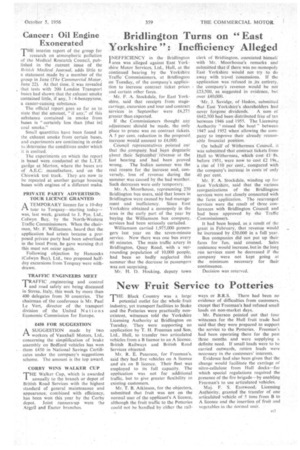New Fruit Service to Potteries
Page 43

If you've noticed an error in this article please click here to report it so we can fix it.
THE Black Country was a large
potential outlet for the whole fruit industry, yet transport facilities to Stoke and the Potteries were practically nonexistent, witnesses told the Yorkshire Licensing Authority at Bridlington on Tuesday. They were supporting an application by T. H. Freeman and Son, Ltd., Hull, to transfer two articulated vehicles from a B licence to an A licence, British Railways and British Road Services objected.
Mr. R. E Paterson, for Freeman's, said they had five vehicles on A licence and six on B licence. Their fleet was employed to its full capacity. The application was not for additional traffic, but to give greater flexibility to existing customers.
Mr. T. B. Atkinson, for the objectors, submitted that fruit was not on the normal user of the applicant's A licence, although the fruit traffic to the Potteries could not he handled by either the rail , ways, or B.R.S. There had been no evidence of difficulties from customers, except that Freeman's had refused small loads on non-market days.
Mr. Paterson pointed out that four witnesses for the Hull fruit trade had said that they were prepared to support the service to the Potteries. Freeman's had been operating there for the past three months and were supplying a definite need. If small loads were to be carried outwards, return loads were necessary in the customers' interests.
Evidence had also been given that the change would facilitate the carriage of nitro-cellulose from Hull docks—for which special regulations required the presence of the fire brigade—by enabling Freeman's to use articulated vehicles.
Maj. F. S. Eastwood, Licensing Authority, granted the transfer of one articulated vehicle of 5 tons from B to A licence and the insertion of fruit and vegetablesin the normal user.
















































































































